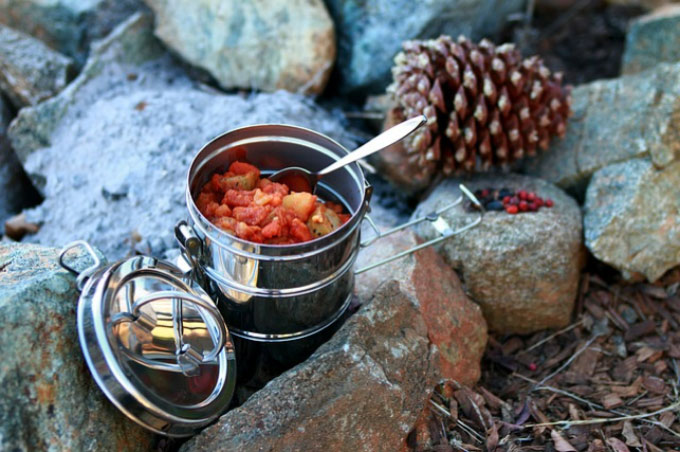If you’re going into the great outdoors for a big hike, or a camping trip your body is going to need a lot more than coffee and marshmallows. Packing light and eating healthy can seem like a big challenge for trips that involve a lot of walking (or just a campfire for cooking); but, with Dr. Bristow’s tips and tricks you’ll be set up for super food success! Read on to find out what you should pack on your next big trip!
If you’re like me and you love heading to the mountains or the lake, then let’s talk. Often times, when we think of camping, we don’t often associate it with eating the healthiest of foods. However, you can absolutely have a very healthy and well-packed food supply for your next trip! Here’s a few of my favourite tips to feeling good and eating clean on the trails.

Tip #1: Dehydrated Meals
I often do long treks, and dehydrated meals have saved me lots of unnecessary back pain. The first long trip I ever did I brought lots of rice and lentils-these felt seriously heavy compared to my new dehydrated friends. You can definitely make them yourself, as long as you have the right kitchen equipment and a good amount of prep time. If you’re short on time, picking some up at a camping store is probably your best bet. The trick to making this healthy is being diligent about reading the ingredients. You can do gluten, soy, dairy, and corn-free pretty easily while still enjoying a nutritious meal. Let’s look at a few examples:
-
Backpackers Pantry Chana Masal:
Ingredients: precooked long grain white rice, garbanzo beans,coconut milk powder (coconut milk and 2% non-GMO tapioca derived from organically grown yuca root), tomato, sea salt, paprika, onion, garlic, turmeric, cilantro, cumin seed, cayenne pepper, coriander seed, crushed red chili pepper, black pepper, ginger, nutmeg, bay leaves, cloves, cinnamon
That’s it! Pretty impressive, no added oils, wheat, dairy, corn, or preservatives. It also has 410 calories and 14 grams of protein for half the bag (1 full meal). Now compare that to:
-
Backpackers Pantry Fettuccini Alfredo with Chicken:
Ingredients: pasta (durum semolina [enriched with niacin, ferrous sulfate, thiamine mononitrate, riboflavin and folic acid]), sauce (romano cheese from cow’s milk [cultured pasteurized part-skim milk, salt, enzymes, disodium phosphate], butter sauce [modified corn starch, salt, whey solids, non-fat dry milk, dehydrated butter, natural butter flavor, sugar, xanthan gum, lactic acid, turmeric and annatto], parmesan cheese (parmesan cheese [cultured part-skim milk, salt, enzymes], disodium phosphate, salt), garlic, pepper, chicken (cooked, diced and freeze-dried), bell pepper.
That’s significantly more ingredients compared to the curry, which only has a long list to itemize the all the spices. For most of my patients, avoiding inflammatory foods like wheat and dairy are crucial to their digestive healing process, which is often the root of their health concerns. You can see how easy it is to make a better choice, and trust me these curry dishes are very delicious. If you eat these often, you may want to consider taking it out of the bag and rehydrating it in a covered pot over the fire so you eliminate any concerns about the bag lining.
Tip #2: Staying hydrated
My favourite purchase of the season has to be my insulated stainless steel water bottle. It really lives up to the advertisement and keeps my beverages cold or hot for hours and hours. Glacier water certainly stays nice and chilly–very refreshing on a hot and sweaty hike!–while extra boiled water makes for a great evening tea. Bringing a variety of herbal teas is a simple and easy way to bring some herbal helpers along the way to help you. If you’re having trouble falling asleep in your new outdoor environment, a sleepy time tea can help you relax and unwind. A couple options are: ginger or peppermint tea for digestion, dandelion root tea for some liver support if you brought any alcohol, or lemon balm to put your body in ease. Check out my favourite tea brand (sold at Superstore!): http://ca.traditionalmedicinals.com/products/
Tip #3: Bring some key supplements
When I’m hiking, I’ve got a few go-to supplements that I never leave behind:
- Magnesium bisglycinate is my favourite form of magnesium for muscle relaxation. It’s common for there to be a few sore muscles by the end of the day, and those well-used muscles can become pretty stiff by the next day. Taking a capsule or two of Magnesium bisglycinate before bed stimulates the relaxation of those muscles so that they are feeling free and ready for day two when I wake up. Remember: magnesium can soften your stool, so don’t overdo it!
- Turmeric is my favourite anti-inflammatory: it’s great for those with old injuries that get a little irritated with lots of activity. Turmeric can help keep the pain and inflammation down, but remember to be gentle with yourself and go at your own pace. After all, it’s not the destination, it’s the journey.
Happy camping!
